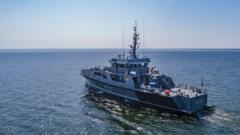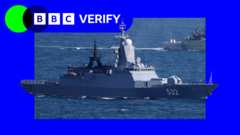In the wake of suspected sabotage on undersea power cables, Estonia has dispatched a patrol vessel to fortify its maritime defenses. Following accusations of Russian involvement in the damage to the Estlink 2 cable, which connects Estonia to Finland, the Estonian military is taking decisive action. NATO has pledged to enhance its presence in the Baltic region as regional tensions escalate. The patrol boat Raju has been tasked with safeguarding the remaining Estlink 1 cable, ensuring that critical energy links remain intact amid rising concerns.
**Estonia Bolsters Naval Defense to Safeguard Undersea Power Cables Amid Suspected Sabotage**

**Estonia Bolsters Naval Defense to Safeguard Undersea Power Cables Amid Suspected Sabotage**
Estonian military ramps up maritime security in response to damaging incidents linked to Russian vessels.
Estonian Defence Minister Hanno Pevkur confirmed that the Raju set sail early on Friday for protective duties. Finland is expected to join this effort to monitor the underwater connections essential for both nations’ energy supplies. In light of the recent incidents, NATO Secretary General Mark Rutte discussed heightened military cooperation with Finnish President Alexander Stubb. Prime Minister Kristen Michal emphasized the possibility of invoking Article 4 of the NATO Treaty, which calls for consultations among member states in the event of perceived threats.
The situation remains precarious following the closure of the 170km (105-mile) Estlink 2 cable, with repairs now expected to stretch into mid-2025. This incident marks the third cable malfunction in a short timespan, raising alarms about the vulnerability of critical infrastructure in the region. Recent analysis from both Finland and the European Union indicates growing concern over what is termed Russia’s "shadow fleet," raising questions about security and environmental risks associated with its activities at sea.
Estonia’s military actions coincide with broader EU efforts to address these threats through potential sanctions targeting vendors linked to Russian operations. Finnish authorities have begun investigations into the suspected Russian-affiliated vessels contributing to the damage. The heavy presence of such ships in the Baltic Sea amplifies regional tensions, creating potential for future incidents. Amid these developments, Estonian officials remain committed to maintaining energy stability for their citizens, assured by the operational readiness of alternative energy sources.
Estonia's proactive measures represent a crucial response to mounting threats in the Baltic, spotlighting the broader geopolitical frictions resulting from the ongoing war in Ukraine. As nations navigate this uncertain landscape, vigilance regarding maritime security and international cooperation will be vital in preserving infrastructure and ensuring energy resilience for the future.
The situation remains precarious following the closure of the 170km (105-mile) Estlink 2 cable, with repairs now expected to stretch into mid-2025. This incident marks the third cable malfunction in a short timespan, raising alarms about the vulnerability of critical infrastructure in the region. Recent analysis from both Finland and the European Union indicates growing concern over what is termed Russia’s "shadow fleet," raising questions about security and environmental risks associated with its activities at sea.
Estonia’s military actions coincide with broader EU efforts to address these threats through potential sanctions targeting vendors linked to Russian operations. Finnish authorities have begun investigations into the suspected Russian-affiliated vessels contributing to the damage. The heavy presence of such ships in the Baltic Sea amplifies regional tensions, creating potential for future incidents. Amid these developments, Estonian officials remain committed to maintaining energy stability for their citizens, assured by the operational readiness of alternative energy sources.
Estonia's proactive measures represent a crucial response to mounting threats in the Baltic, spotlighting the broader geopolitical frictions resulting from the ongoing war in Ukraine. As nations navigate this uncertain landscape, vigilance regarding maritime security and international cooperation will be vital in preserving infrastructure and ensuring energy resilience for the future.























